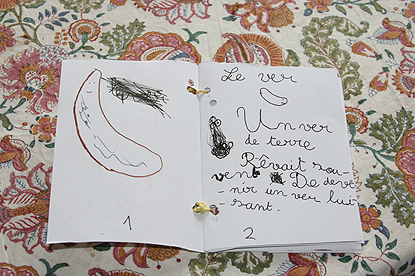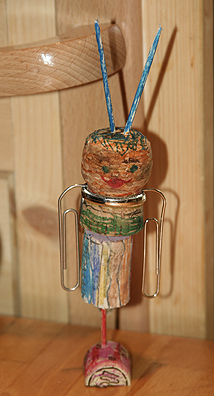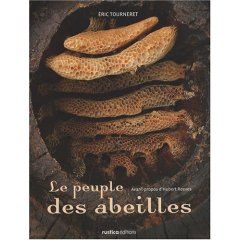Every so often, I read a post in which someone is getting all depressed about the rosy picture of homeschooling we all paint in our blogs. So I thought I would describe our day. It’s the kind of bad day that’s already quite funny in retrospect even though it’s not really over.
The bad really started yesterday evening when Antonia’s swimming class for today was suddenly cancelled taking a whole pile of other plans with it. She didn’t know about this as she was already asleep… that is until she woke up at 2am and came to our bed. I didn’t manage to wake up properly at the time. I remember grumbling something vague, and feeling as if my head was about to explode. I later learned that the other two had opened the built-in cupboard that is our bed head, laying the door down on top of me, in order to remove an extra duvet. Because Little Miss’s feet were too warm while her arms were too cold or vice versa. Apparently I didn’t really wake up, but I didn’t sleep well either, and the other two didn’t really get much sleep at all. This boded badly for everybody’s day.
At 8.30 am we were all awake and theoretically having breakfast. The weather outside was dreary and damp. On finding out she wasn’t going swimming Antonia pulled one of her ‘I’m going to cry faces’. I was attempting to learn the location of all the countries of the world, which is about as much of an intellectual endeavour as I can manage just now. Antonia dumped herself in my lap, pretty much on the computer, so I put on the game that just has the continents and oceans, assuming she knew them. She went off in a huff, which is her way of letting me know she’s forgotten them.
Meanwhile Mike was seeking out alternative swimming arrangements with other friends which turned out to be only possible between 12.00 and 2.00, so we would be having a late lunch. I called Antonia back and informed her we were starting lessons now. So, back to the continents and oceans game, and 5 minutes later, she’s telling me she loves it. So I let her have a go at Western Europe too.
Then we turned to the 2nd grade maths book, French style. This maths book serves two educational purposes. The first is to teach kids maths, as in other countries. The second is to prepare them to navigate French bureaucracy, such that, by the time they are adults, they hardly even notice it. Even at 1st grade level the pages are laid out like nicely illustrated tax forms. The children have to correlate information from various places and jump through odd hoops. Even I sometimes have to read the page twice to figure out what they’re asking and why. Cutting to the essentials, the problems we were doing today took the form:
Method A
(5+2+3) x 8 = …. + …. = ….
Method B
(5×8) + (2×8) + (3×8) = ….+ ….+ …. = ….
… where method A and method B are of course two ways of achieving the same thing. In this case the problem should be actualised as three columns of 5, 2, and 3 elements in 8 rows. My goal for today was the ‘easy’ one of having her set up the cuisinaire rods for the problems, and to leave the calculations for another day. Unfortunately, Antonia does not like manipulatives and getting her to use them is an uphill struggle. Rightly or wrongly, I think it may be worthwhile for her to overcome this distaste, so I bring the wretched things out every time I know she will not figure out the answer before reading the question (!) She pushed the right quantity of cuisinaire rods vaguely onto the table and stirred them with her finger. Then she got into a huff again when I said I would start the laundry while she was arranging them. The thing is, that while it’s very hard to get her to actualise abstract problems with manipulatives, it’s virtually impossible to stop her turning the manipulative situations into abstract expressions. She had written most of the appropriate sums underneath her rows and columns before I even came back. So we ended up doing one problem completely, and she escaped doing more manipulatives.
After that she went off to play the piano, then to find her swimming costume, then to tell me in Chinese that she is French, because we’re using a French book to learn Chinese and they don’t stretch to “I am English”, then to brush her hair three times, because she forgot what she was doing each time on the way. Then she bugged me to show her the nine times table, because she wanted to know about the pattern I had been promising her. I was reluctant to embark on this because Mike was already moving into the complicated sequence that eventually leads to him leaving the house. I milled around waiting.
They were gone. I decided to be zen about the fact that my whole afternoon for housecleaning and translating work had turned into a mere two hours, and to just get on with it. Fortunately, the stuff I had written in the second book of my project turned out to be much better than I had thought. Unfortunately, the mango we had been planning to eat for our dessert turned out to be the kind you make pickles out of. Fortunately, I got away without having to empty the vacuum cleaner.
I guess that at the pool, Antonia got hurt several times and had at least one of her hysterical fits that tend to leave other people seriously worried about her. The first thing our friend asked when she called later that day was whether she was alright. As usual, Antonia herself was quite cheerful about “getting bumped hard”, and all Mike said was that she was diving really well.
Mike is currently the house chef. When he got back from the pool, he turned the mango-for-pickling into thai fish and mango curry which was delicious. The best part of the day, in fact. Antonia and I spent the afternoon trying to persuade ourselves that we wouldn’t have a nap. We read and listened to music. She cried because the music was sad, so I found something else. She wrote a couple of sentences. Then she decided to make the Italian breadsticks coated with chocolate recipe she’s been wanting to try. You can just feel another disaster brewing, can’t you?
This recipe should be the easiest thing you can imagine. I didn’t say anything when she chose Cadbury’s Dairy Milk for the chocolate, even though I can’t stand the stuff. It was her recipe, after all. I didn’t say anything about melting it in the microwave, although I was dubious, because I felt, rightly or wrongly, that following the recipe instructions was a worthy endeavour for her, and I didn’t want to disrupt it. Microwaved Cadbury’s Dairy Milk turns into calcinated lumps enrobed in sludge. We ditched the instructions and tried again with a bain-marie. Figuring we were safe, we went off to do paper sculptures/origami. More than half an hour later, the Dairy Milk consisted of solid whitish lumps enrobed in sludge. Mike took a hand and turned it into a uniformly grainy mass that looked like milk curds swimming in fat. I read the ingredients of the Dairy Milk and decided there is a damn good reason why the European Union doesn’t let them call it chocolate, and an even better reason why I don’t eat the stuff. We gave up on the recipe and I went to take a bath.
A little while later, Mike showed up at the door. He had that look on his face. “What have I done?”, I said. He went on looking. “What has she done, then?” Still the look. “So what have you done?” After a while the story came out. Antonia had tried to take an egg for one of her informal ‘science experiments’. He had decided that eggs cost money and are for eating, and that she therefore shouldn’t be doing that. He took the egg back off her. Then, since it was already cracked, he ate it! Antonia stormed off to her bedroom. It seemed like he didn’t know what he should do next.
I suggested to him that if we restricted Antonia’s access to anything that cost money and had a purpose other than the one she intended to use it for, she might not learn very much. I offered to buy her cheap (non-organic) eggs to do what she wanted with, like the oil, flour, salt and vinegar she already has. I pointed out that there were lots of very interesting experiments to be done with eggs. He grumped and growled and claimed to draw a distinction between real experiments and “just mixing things up like Horrid Henry”. I think he was feeling guilty, and worried that I might point out the actual cost of one egg in relation to the cost of other forms of child entertainment. I would have been thinking that if I had been him.
He left to coax his daughter out of her room and to try to agree on some form of protein that she was willing to eat for her supper. When I came down he was watching her make plastic ornaments out of Haba beads while her beans and rice mixture cooked. She finished her supper just as it was bedtime. At that moment he remembered that she had not called any members of his family for a while, and that it had to be done today. While she was doing that, he took a call from a friend about a weed whacker we’ve borrowed that nobody knows how to use. Said friend doesn’t know either, but he was willing to come over and try to figure it out with Mike, at dusk, on a damp evening. Hmmm…. fortunately they thought better of it. I cleaned up and found a manual for the weed whacker on the Internet.
Rather late, we got Antonia into bed, after I persuaded her not to cry because her Haba beads had melted over the hole she intended to pass the chain through for a pendant. I assured her it would be easy to make a new hole. Often, at bedtime, she likes to talk to us about science, but today she had a mini-crisis about one of her friends whose mother is single, and what would happen if her Daddy went away, etc… At 10.00, her Daddy did go away – to bed, claiming utter exhaustion! At 10.30, I nearly fell over her on the dark landing as I was leaving the bathroom. She looked forlorn, and asked me in her most woebegone way for more cuddles. At 11.00, she is actually asleep, until tomorrow morning, I sincerely hope.



